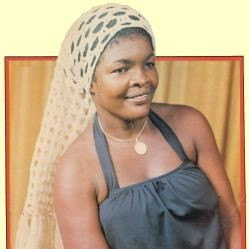


NEWS:
Only a few days left to hear our September stream - otherwise go to MixCloud to listen without detailed artist/gig info
Artist Info
|
Nora Dean   Nora Dean (born 8 January 1944, Spanish Town, Jamaica – died 29 September 2016, Connecticut, USA, aged 72) was a Jamaican reggae and gospel singer. Nora Dean (born 8 January 1944, Spanish Town, Jamaica – died 29 September 2016, Connecticut, USA, aged 72) was a Jamaican reggae and gospel singer. Singer Nora Dean was one of reggae’s greatest mysteries including her birth year which some sources quote as 1952. She recorded solo and as a member of [a237518], [a349291] and [a350781]. She did backing vocals on recordings by Jimmy Cliff. Although she was not a prolific artist (especially by reggae standards), a number of her songs are very fondly remembered by fans of Jamaican music as true reggae classics. No interviews with her have ever been published. Photos seemed to be non-existent. In “Barbwire”, her most famous song she plays babyishly naïve about a man’s advances. It is set to the classic The Techniques "You Don't Care" riddim. She once remembered that she worked four hours voicing the track, though in the end, they went back to the first take. She was paid 30 pounds over 9 months for this song, that has sold at least 13 million copies worldwide. This is a situation that is known all too well by Jamaican recording artists. In “Mojo Girl”, she is serenely in full control. She lays down the law to her man, threatening him with black magic reprisals. In “Wreck A Buddy”, she is in desperate carnal need, with explicit lyrics to the melody of “Little Drummer Boy”. In “The Same Thing You Gave To Daddy”, she is in a battle of wills with her little boy, who won't go to sleep until he gets what Nora gave his daddy the night before. “Oh, no, no, no”, indeed! And in “Ay Ay Ay”, the music is deconstructed from reggae to a drone. Narrative is abandoned in favor of free association, and words become invocations that are supplemented with kisses, bird cries and groans of pure ecstasy. In some cases, as a young woman she was pressured by producers to act outside of her character. And at least one scandalous song, a cover of the mento song "Night Food", Nora insisted she did not record. She was upset that her name was affixed to a song she found so repugnant. Nora Dean moved to New York City in 1976 and married a man also of Jamaican origin. She joined the Times Square Church, where she sang in the choir. A serious and protracted illness lead her to realize the power of prayer, and she was born again in 1981. She released a few gospel CD's, some solo, some with a choir. She continued to perform live at gospel shows with other former secular reggae stars, such as Hopeton Lewis and Owen Gray. She moved to Connecticut in 2010. Artist biography from Discogs Some other places to look for information: last.fm Discogs MusicBrainz |
